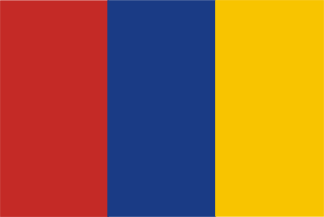 image by Jaume Ollé, 20 October 2001
image by Jaume Ollé, 20 October 2001 
Last modified: 2024-03-02 by rob raeside
Keywords: colombia | new granada | nueva granada | granada |
Links: FOTW homepage |
search |
disclaimer and copyright |
write us |
mirrors
 image by Jaume Ollé, 20 October 2001
image by Jaume Ollé, 20 October 2001
See also:
The Republic was established after the dissolvement of the
Republic of Colombia (Great Colombia) with seccession of
Ecuador (Quito, Guayaquil and Azuay) and Venezuela (with
Orinoco, Apure and Zulia) and was formed by the
departments of Boyaca, Cauca, Cundinamarca, Magdalena
and Istmo, all in the current Republic of Colombia (except
Istmo that is the current Panama). On November 1831 those
departments created the Republic of Nueva Granada, but nothing
was established about symbols. Old symbols were confirmed
provisory by the National Convention of 17 Dicember 1831. It is
not clear what flag was it: Restrepo believe that is the flag
with two cornucopias of Great Colombia. While new symbols were
discused some proposals were issued. On 9 May 1834, the
national flag was adopted and was used
until 26 November 1861, with the greatcolombian colors
in Veles arrangement. Merchant ensign has the eighpointed star in
white. In 1851 new civil war when conservative ans slavist
from Cauca and Antioquia, led by Manuel Ibánez, Julio
Arboleda and Eusebio Borrero, revolted against liberal
president José Hilario López trying to stop the process
of liberation of slaves and for some religious affairs.
Jaume Ollé, 20 October 2001
Proposal based in the old Cartagena colors
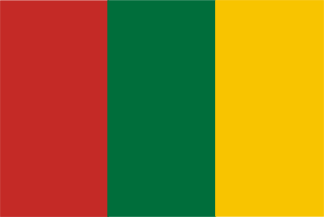 image by Jaume Ollé, 20 October 2001
image by Jaume Ollé, 20 October 2001
Ratio 2:3. Adopted: Never. The flag is based is the old
Republic of Cartagena colours.
Jaume Ollé 20 December 1996
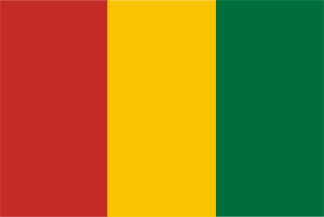 image by Jaume Ollé, 20 October 2001
image by Jaume Ollé, 20 October 2001
Flagmaster quote similar (same?) proposal
dated 24 December 1833 from Alejandro Vélez Barrientos, but it
must be a mistake and the correct Veles proposal is the previous
one.
Jaume Ollé, 20 October 2001
Proposal for a merchant ensign
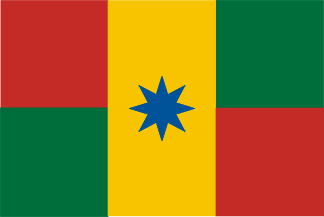 image by Jaume Ollé, 20 October 2001
image by Jaume Ollé, 20 October 2001
Alejandro Vélez Barrientos also proposed a merchant ensign.
Jaume Ollé, 20 October 2001
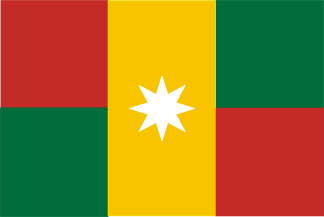 image by Jaume Ollé, 20 October 2001
image by Jaume Ollé, 20 October 2001
This flags were close to be adopted on 3 January
1834, the proposals of Vélez were in way to be adopted with a
minor modification: in the merchant flag the star must be white
instead of blue, but Santander rejected the proposals at the end.
Jaume Ollé, 20 October 2001
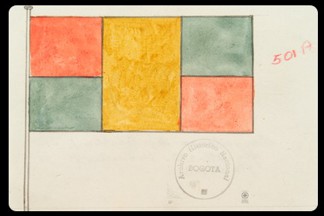
rng-1833.jpg)
rng1-2.jpg) images located by Esteban
Rivera, 21 July 2023
images located by Esteban
Rivera, 21 July 2023
In 1833 (or possibly even before during his tenure as Minister of Foreign
Affairs 1831-1832) Alejandro Vélez Barrientos proposed a version of the Coat of
Arms which featured a horse in it (source:
https://www.elnuevosiglo.com.co).
However, it was not adopted.
Esteban Rivera, 21 July 2023
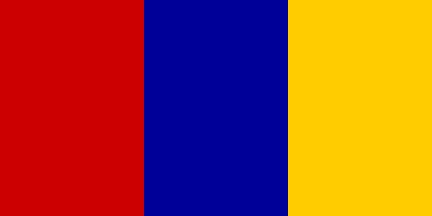 image by Jorge Candeias, 1 October 1999
image by Jorge Candeias, 1 October 1999
1:2 variant
Adopted: 9 May 1834. Abolished: 26 November 1861.
The republic was proclaimed in Novemebr 1831 in the departments
of Boyaca, Cauca, Cundinamarca, Isthmus and Magdalena (two years
after the deccesion of Quito and Guayaquil), but the flag and
arms were ratified 17 December 1831. The flag was confirmed for
the government of the Grenadine Confederation, proclaimed in May
1856 with eight states (Antioquia, Bolivar, Boyaca, Cauca,
Cundinamarca, Isthmus, Magdalena and Santander).
Jaume Ollé, 20 December 1996
From http://www.presidencia.gov.co/historia/emblemas.htm
(defunct):
"At 8 May 1834 when the verticality triumphs, is adopted as
a banner of Nueva Granada" [the flag is a vertical
tricolour, red, blue and yellow in 1:2 proportions].
Jorge Candeias, 1 October 1999
The flag of New Granada/Colombia with vertical stripes had (in
the state flag) the coat of arms in the center. a site shows a pic with
the full coat of arms with flags on either side. The source given is an
original one describing the law and showing a picture of the
flag. That picture is redrawn and shown on that flag site with
explaining text that there were several versions of the arms on
the flag, although the source says that the CoA were not changed
for a long time. What the publisher or editor of this Colombian
page did not see was the small note beside the flag in the
original book, which says "the full CoA is only in the flag
for decorative reasons, the correct flag only shows the shield of
the coat of arms". That question had been answered in 1939 (!) by
Ottfried Neubecker, and can be read in that original book, but
not in later flag books, who "proudly" show the full coat of arms in that flag, although that is wrong!
Ralf Stelter, 27 June 1999
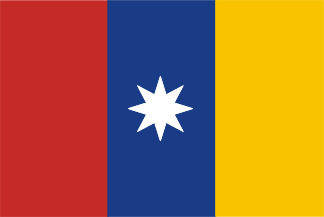 image by Jaume Ollé, 20 October 2001
image by Jaume Ollé, 20 October 2001
Merchant Ensign - Ratio 2:3. Adopted: 9 May 1834. Abolished:
26 July 1861. The star was changed "de facto" to
fivepointed one.
Jaume Ollé, 20 December 1996
This flag appear in 1:1 form at Steenbergen Book (1862) [stb] as No. 348 - New Grenada merchant.
Jaume Ollé, 11 March 2003
Variant
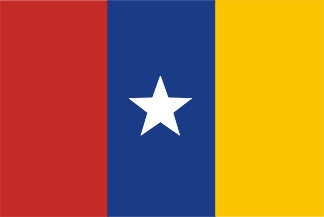 image by Jaume Ollé, 20 October 2001
image by Jaume Ollé, 20 October 2001
De facto, the star in the merchant ensign was changed to a
fivepointed one.
Jaume Ollé, 20 October 2001
1) 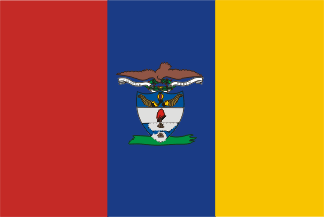 image by Jaume Ollé, 20 October 2001
image by Jaume Ollé, 20 October 2001
2) 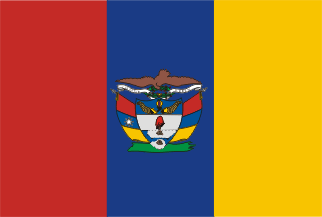 image by Jaume Ollé, 20 October 2001
image by Jaume Ollé, 20 October 2001
3) 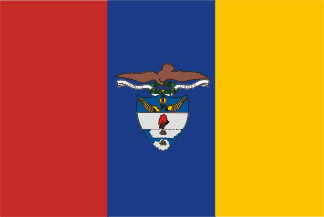 image by Jaume Ollé, 20 October 2001
image by Jaume Ollé, 20 October 2001
This flag appear in 1:1 form at Steenbergen Book (1862) [stb] as No. 349 - New Granada war. In
the ribbon that the eagle hold in his beak is the motto
"Libertad y orden" (Freedom and order).
Jaume Ollé, 11 March 2003
4) 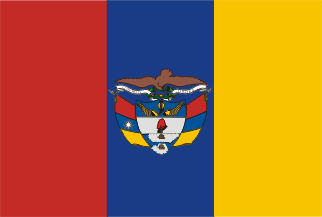 image by Jaume Ollé, 20 October 2001
image by Jaume Ollé, 20 October 2001
5) 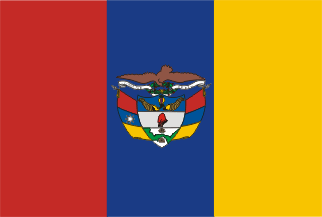 image by Jaume Ollé, 20 October 2001
image by Jaume Ollé, 20 October 2001
6) 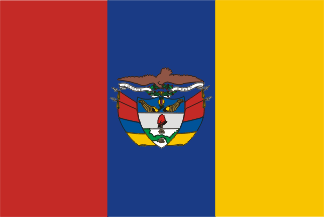 image by Jaume Ollé, 20 October 2001
image by Jaume Ollé, 20 October 2001
Ratio 2:3. Adopted: 9 May 1834. Abolished: 26 November 1861.
The colour of the ithmus was changed de facto to green. On the
sides of the shield there were added, also de facto, two flags
(to the right of the observe the war flag and to the left the
merchant ensign) and afterwards it was increased to four flags
(two to each side), that finally obtained their legal sanction
many years after. The green base of the shield disappeared very
soon. The moto is: "Libertad - orden"
(Freedom - Order).
Jaume Ollé, 20 December 1996
Navel ensign, military flag and flag for
the external representatives. Succesive changes were issued
in the arms were really used. When the base disapeared, Istmus
was represented in green. Later the flags in the arms were two
instead a single one.
Jaume Ollé, 20 October 2001
At J.W Norie - J.S. Hobbs: Flaggen aller seefahrenden
Nationen, 1971 [nor71] (original
print 1848):
280 New Granada - as above except with flywise stripes, the coat of arms off-set towards the fly, with the shield (with the scroll on top
of it) fitting the blue stripe, and the bird mirrored and yellow
outlined black. (It's not possible to recognize any green base
under the shield.)
Peter Hans van den Muijzenberg, 12 November 2001
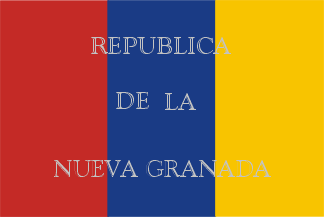 image by Jaume Ollé, 20 October 2001
image by Jaume Ollé, 20 October 2001
Ratio 2:3. Adopted: 20 May 1849. Abolished: 26 November 1861.
On the reverse of the flags and banners of the local National
Guard appeard the name of the army body (identified according to
the name of the administrative canton) and the motto: Freedom and
order. (Libertad y orden) . On the reverse of the flags of the
auxiliary National Guard appeard "Battalion number X of
National Guard". The color of the letters was not specified
Jaume Ollé, 20 December 1996
On 20 May 1849, the National Guard flag was adopted . In the
reverse there was the inscription: "batallon número XX de
la Guardia Nacional". Color of the letters is not quoted,
but In my opinion, probably argent.
Jaume Ollé, 20 October 2001
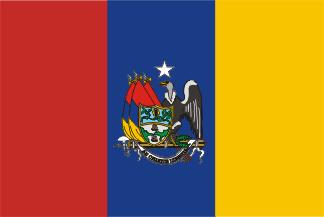 image by Jaume Ollé, 20 October 2001
image by Jaume Ollé, 20 October 2001
rng7.gif) image by Jaume Ollé, 20 October 2001
image by Jaume Ollé, 20 October 2001
Ratio 2:3. Adopted: April 1854 (?). Abolished: December 1854
(?). The motto is: "Ab ordine libertas" .
Jaume Ollé, 20 December 1996
Another war started 1854 when José María Melo made a
coup d'etat against José María Obando on 17 april
1854. After the coup, several generals created their own
regional armies and went to Bogota where Melo was defeated.
During Melo presidency a different naval ensign was used (c.
April to December 1854). It iss not known weather any text was
creating the new arms, but illustration is published by
Bohorquez, from where it was taken by Ortega Ricaurte. After Melo
was defeated, the previous ensign was in use (in part of the
country it was never supressed).
Jaume Ollé, 20 October 2001
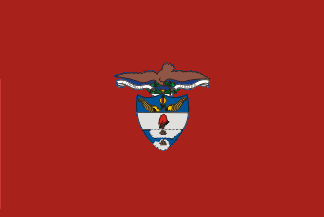 image by E.R., 10 August 2009
image by E.R., 10 August 2009
Reconstructed Army Flag
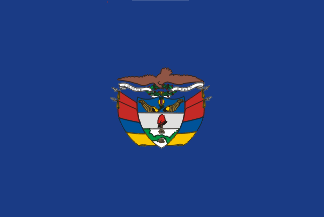 image by E.R., 10 August 2009
image by E.R., 10 August 2009
Reconstructed Navy Flag
During a military parade held in the Municipality of Tame, in
the Department of Arauca, there were the flags of the Colombian
Navy and Army as seen in this photo.
On the left hand side of the picture, one can see the dark blue
Navy flag with the coat of arms of the Republica de Nueva
Granada (Republic of New Granada) which existed between 1831
and 1856.
On the right hand side of the above mentioned picture, one can
see the red Army flag with the same Coat of Arms.
This leads me to think that those were the first Colombian Navy
and Army flags after its independence. I also believe that the
flags shown in the photograph are reconstructions, since the
correct version of the Coat of Arms is the one below. For example
notice the Condor pointing down here and notice the pointing to
the left on the Army website picture. Also notice that the two
flags at the sides of the coat of arms have yellow as the top
color which is incorrect as the top color should be red.
E.R., 10 August 2009
rng1.gif) image by Eugene Ipavec, 14 May 2009
image by Eugene Ipavec, 14 May 2009
Based on page 58 of the book "Himnos y Símbolos de
Nuestra Colombia", by Julio César García, Published in
2000 by Camer Editores, ISBN 958-33-1489-7.
The Enciclopedia Nuestra Colombia image is essentially identical,
except in that the arms include a patch of ground beneath the
shield.
E.R., and Eugene Ipavec, 14 May 2009
This
image is of better quality and it is a true representation of the
coat of arms.
Esteban Rivera, 21 April 2010
There's a sketch (20 X 16 cms) of a proposal for a Coat of Arms for the
Republic of New Granada (1830-1858) The
original sketch
from the Archivo General de la Nación (General Archives of the Nation, a
government entity dedicated to preserve historical documents), as seen on the
seal stamped in the sketch, on the top right hand corner, dates back to 1833.
In
1833, Doctor Alejandro Vélez proposed to Congress a project on a new flag and
CoA for the country.
The flag proposed by him was to be the same flag used by the United Provinces
of the New Granada in 1815 but with vertical stripes instead.
The Coat of Arms proposed by him is the one
seen in this skecth:
http://www.mincultura.gov.co/bicentenario/wp-content/uploads/2010/02/Arch-GN15.jpg
A render colored version of the previous sketch is seen here:
http://es.wikipedia.org/wiki/Archivo:Escudo_de_la_Nueva_Granada_(propuesta).svg
Sources:
http://www.mincultura.gov.co/bicentenario/?page_id=1316 (Ministry of
Agriculture of Colombia, official website),
Wikipedia page on Coat of Arms.
Esteban Rivera, 21 April 2010
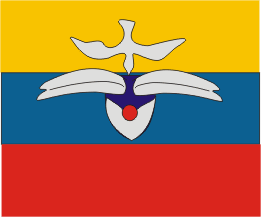 image by Jaume Ollé, 28 September 2003
image by Jaume Ollé, 28 September 2003
No. 1039 - New Grenada, state and navy. On the ribbon is
written "Libertad y orden". [stb]
Jaume Ollé, 28 September 2003
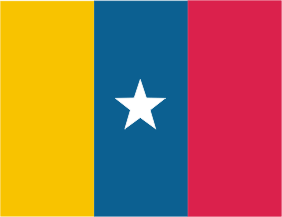 image by Jaume Ollé, 13 October 2003
image by Jaume Ollé, 13 October 2003
No. 1065 - New Grenada. [stb]
Jaume Ollé, 13 October 2003
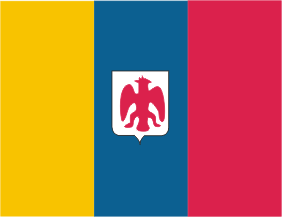 image by Jaume Ollé, 13 October 2003
image by Jaume Ollé, 13 October 2003
No. 1066 - Uncaptioned, but supposedly New Grenada. [stb]
Jaume Ollé, 13 October 2003
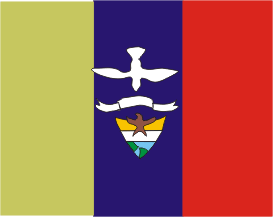 image by Jaume Ollé, 7 November 2003
image by Jaume Ollé, 7 November 2003
No. 1147 - New Grenada [the light green must be in fact
yellow].[stb]
Jaume Ollé, 7 November 2003